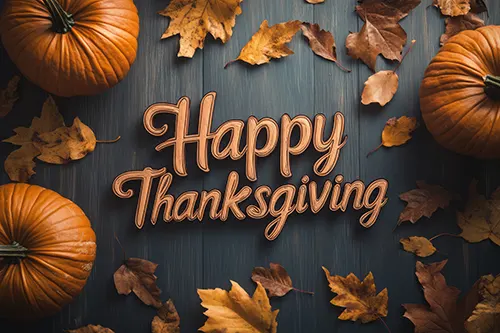
Veterans Day is a time to honor and thank those who have served in the military for their sacrifices and dedication. It’s an important day to show appreciation.
You might consider writing a heartfelt letter or spending time with a veteran, listening to their stories and sharing in their experiences. Volunteering at a local veterans' organization or donating to nonprofits that support veterans' health and well-being can also make a meaningful impact. Even simple acts like attending a Veterans Day ceremony or flying the American flag show respect and solidarity.
Your efforts can help veterans feel valued and supported, not just on this day, but throughout the year.
Here are some ideas.
Say "Thank You Veterans" by Showing Up
Attend a Veterans Day event in your area -- not just a picnic with friends but an honest-to-goodness parade or service for veterans. Roy Rogers said, "We can't all be heroes; someone has to sit on the curb and clap as they go by." Veterans Day is a great opportunity to do just that.
Donate to Veteran-Focused Charities
There are a plethora of wonderful organizations that offer all manner of support, services and appreciation for our service members. To get a few ideas for veteran donations, check out some charities that make a difference in the veteran community.
Fly a Flag - Correctly
- Veterans Day is a great opportunity to fly the flag. Just make sure you're observing the proper rules for display. Here are a few of those important tips:
- Never drag a U.S. flag on the ground or let it touch the ground.
- Don't drape it over the hood, top, sides or back of a vehicle.
- Don't display the U.S. flag above any other flag, and keep it at the center when it's surrounded by other flags.
- Don't display a tattered or torn flag. Flags that are tattered and torn should be disposed of in a respectful way, preferably by burning.
- Never use the flag as apparel, bedding or drapery.
- Ask Someone About Their Service
It seems like we all know someone who has served, and Veterans Day is a great time to ask them about their service. Learning more about their service can help you appropriately say "thank you."
Questions You Can Ask Veterans
- Here are some questions to get you started:
- What did you do in the military?
- How long did you serve?
- What was your favorite moment in all your time in the service?
- Did anyone else in your family serve?
- Why did you go into the service branch that you did?
Do not ask whether they've killed anyone. If you’re talking to a combat vet, be supportive without being intrusive. Sometimes you don't have to say much of anything; just listen and give them your full attention.
Write a Letter to Say ‘Thank you, Veterans’
If you know a veteran, write a simple letter, postcard or email that recognizes them on Veterans Day. If you don't know a veteran, look up the closest military installation and send one there. Small acts of recognizing someone's service, even anonymously, are appreciated.
The military-focused nonprofit Soldiers' Angels organizes volunteers to write letters to deployed troops, veterans and their caregivers through its Letters for Soldiers initiative.
Don't Confuse Veterans Day with Memorial Day
Veterans Day is a time to thank those who are serving or have served and are still with us. Memorial Day is to reflect and remember those who lost their lives in service to their country. Confusing the two or combining the two diminishes the importance of both.
Visit a VA Hospital
Find out what the policies are at your nearest VA hospital for interacting with patients or volunteering, and spend the day with a veteran. Many VA facilities will have events on Veterans Day or a special lunch you can help prepare. Even if you never interact with a veteran, helping at a facility is a way to give back and saying "thank you veterans."
Get Outdoors with a Veteran
Invite a veteran or a military family to explore a national park; admission is free for all visitors on Veterans Day. Being outside helps improve physical and mental health, boosts emotional well-being and is a great way to celebrate the day with a veteran.
Source: military.com





